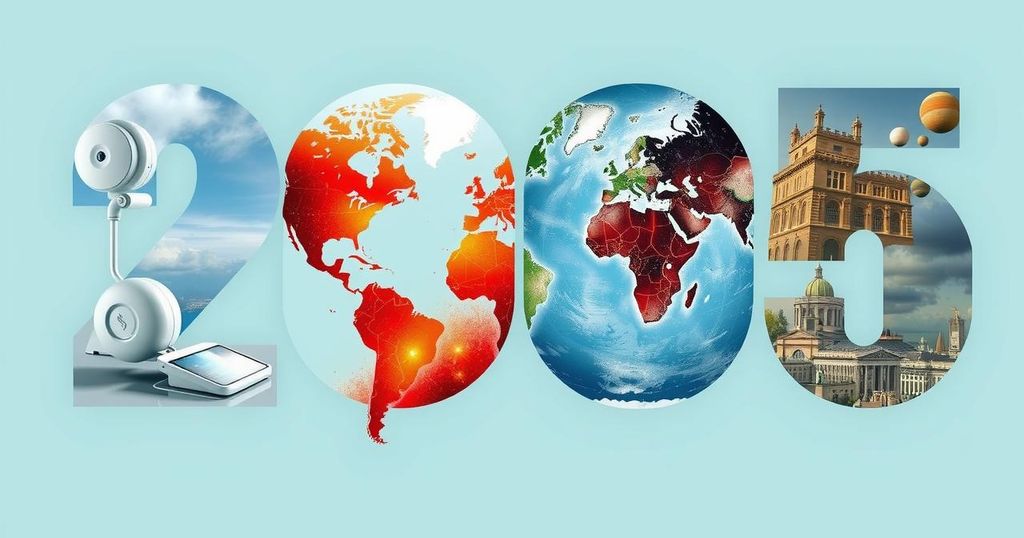As 2025 approaches, global concerns about inflation, AI job losses, climate change, and immigration remain prominent. A survey indicates a slight increase in optimism, with 71% of respondents believing the next year will be better. Economic stability and technological advancements are key themes, despite ongoing societal anxieties. While inflation and job security dominate concerns, perceptions of immigration and technological change reveal a complex landscape of hope and fear.
As we approach 2025, persistent concerns such as inflation, job losses attributed to artificial intelligence, climate change, and increasing immigration influence public sentiment globally. Despite these challenges, a cautious sense of optimism is emerging. A survey conducted across 33 countries revealed that 71% of respondents feel the upcoming year will be better than the previous one, reflecting a modest improvement in outlook compared to 2024. Key themes affecting this perspective include economic stability, societal anxieties, and technological advancements. In particular, while the cost-of-living crisis and geopolitical conflicts remain pressing issues, there is a slight decline in the perception of 2024 as a bad year; the percentage of individuals describing it as such has fallen to 51% for families and 65% for countries, indicating a resilience and cautious hope for improvement.
Economic concerns are paramount, with 79% of respondents anticipating that inflation will outpace income growth in 2025, a trend established since 2022. An overwhelming 74% expect tax increases, revealing ongoing financial apprehensions. Interestingly, there is a notable decline in expectations for rising interest rates, pointing to a belief that central banks might relax their monetary policies.
For Latinos in the United States, economic worries resonate alongside global concerns regarding job security and cost-of-living increases. Although the fear of job displacement due to artificial intelligence remains high at 65%, there exists a nuanced perspective among 43% who recognize the potential opportunities AI may offer.
In Latin America, economic fears parallel global anxieties, with inflation and unemployment being major worries. Citizens in countries such as Brazil, Mexico, and Argentina express cautious optimism regarding potential economic stabilization, despite prevalent concerns about rising expenses and instability.
Immigration continues to be a contentious topic, with 67% of respondents across 33 nations expecting an increase in immigration in 2025, albeit a slight decrease from 71% in 2024. Disparities in expectations are evident; countries like Turkey and Spain forecast higher immigration rates than the USA or Canada, highlighting a prevailing belief that public perceptions about immigration are often shaped by societal fears rather than statistical realities.
Concerns surrounding job displacement due to technological advancements persist. While many fear job losses linked to AI, there are also hopeful feelings regarding innovation in sectors such as healthcare and transportation, with 40% believing significant medical breakthroughs, like a cancer cure, may be imminent.
Environmental worries persist as well, with 80% of respondents predicting escalating global temperatures and 72% expecting more extreme weather events. However, confidence in government action to address climate change has waned, with the percentage expecting stricter carbon emission controls declining to 52%.
The article highlights ongoing global concerns as individuals approach 2025, with inflation, job security linked to advancements in artificial intelligence, climate change, and immigration as central issues. Public sentiment shows a slight shift towards optimism, despite economic and geopolitical challenges around the world. The survey data reveal important insights into how people perceive their circumstances and expectations for the future, indicating resilience in the face of adversity. The complexities of these issues, particularly in relation to economic stability and environmental challenges, underscore the varied perspectives among different populations.
In summary, the outlook for 2025 is shaped by notable concerns including inflation, job displacement from technological advancements, climate change, and immigration trends. Nevertheless, a growing sense of cautious optimism is emerging among global populations, as evidenced by survey responses highlighting a decline in negative perceptions regarding the previous year. As economic anxieties remain prevalent, understanding the nuances of public sentiment will be essential for addressing these interconnected issues effectively.
Original Source: www.latintimes.com






